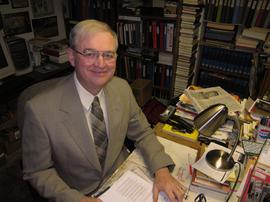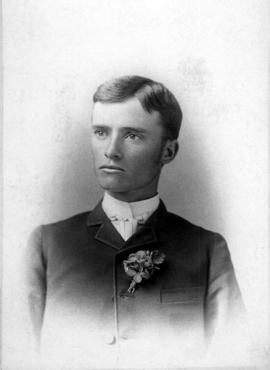The John E. Miller papers are composed of materials collected by Dr. Miller during his career. Included is course material, interviews, talks, writings, Laura Ingalls Wilder, and friends and colleagues. The bulk of the material is Laura Ingalls Wilder and research for his many other writings.
GENERAL MATERIAL
The general material consists of files related to Dr. Miller’s personal life outside of teaching and writing. He was involved with many organizations, such as the South Dakota Humanities Council, the South Dakota State Historical Society, Phi Kappa Phi, and history conferences, such as the Midwestern History Association and the Dakota History Conference. Included are correspondence, photographs, awards, articles about Miller, SDSU material, and family files.
COURSE MATERIALS.
Dr. Miller taught many courses during his tenure as a faculty member of the History Department at South Dakota State University. Courses include U.S. History, South Dakota history, American economic history, and methods and philosophy of history. After his retirement he taught Osher Lifetime Learning Institute [OLLI] courses on many topics such as the great depression, U.S. president and legislators, and democracy. Included are course notes, exams, and other material related to teaching history.
FRIENDS AND COLLEAGUES
This material is composed of material gathered on friends and colleagues. Included is correspondence, articles, clippings, and photographs.
INTERVIEWS.
Dr. Miller conducted many oral history interviews during the course of his career. The recordings include many important historical figures, such as George McGovern and John Wooden, as well as prominent members of the South Dakota State University community, and SDSU faculty, staff, and administrators. His early interviews were recorded on audiocassettes, and eventually upgraded to digital recorders. There are some transcripts and permission forms for these recordings, but not all.
See the audiovisual and electronic media series for the recordings.
TALKS, PRESENTATIONS, ETC.
This series consists of many talks, presentations, and workshops given by Dr. Miller throughout his career. He also served on panels at conferences, including the Dakota History Conference and Laurapalooza. Included are notes used articles, journals, books, and research material.
LAURA INGALLS WILDER
Dr. Miller is one of America's leading authorities on Laura Ingalls Wilder and Rose Wilder Lane, having written many books and articles on the Wilder’s. Material consists of 16 boxes of research on books written by Laura Ingalls Wilder and her daughter, Rose Wilder Lane, the Ingalls-Wilder family, places where Wilder lived, notebooks of handwritten notes, critiques of other authors works on Wilder, articles and clippings on related to Wilder, research gathered from manuscript collections related to Wilder, other authors works, and Dr. Miller’s writings.
WRITINGS
Dr. Miller wrote many articles, books, and reviews during his career. He also wrote book chapters, collaborated with other authors, and encyclopedia entries. He was a very prolific writer and it is difficult to know whether everything he ever wrote is included in the collection. Included are manuscripts, books, articles, book proposals, notes, and correspondence with other authors and publishers.
RESEARCH
The research material is composed of material collected by Dr. Miller for various projects. Researchers will find material on topics such as politics, elections, democracy, U.S. and South Dakota history, sports, small towns, and creativity; and historical figures such as Johnny Carson, Lawrence Welk, Sam Walton, John Wooden, Walt Disney, George McGovern, Karl Mundt, Alvin Hanson and many others too numerous to list. This material was used in his writings and in teaching his courses at SDSU.
Included are 40 boxes of articles and clippings from newspapers, magazines, scholarly journals, books, and online research gathered during his many trips to archives, historical societies and libraries. The material consists of notebooks and handwritten notes, writings, publications, books, and photographs. The majority of the material is photocopies, but some books, magazines, and journals are also included.
The Brookings County research is composed of research gathered by John E. Miller from the Donald D. Parker Collection held at the Center for Western Studies, Augustana College, in Sioux Falls, South Dakota. Donald D. Parker was Head of the History Department at South Dakota State University from 1943-1965. Folders consist mainly of research on early Brookings County, South Dakota and covers the years from circa 1870-1930.
The Hubert B. Mathews and Hubert Jean Mathieu Hubert B. Mathews attended Dakota Agricultural College in Brookings in 1888 and accepted a position on the college staff in 1893. He became head of the physics Department, and was the first acting dean of the Division of Engineering. He was Vice President at South Dakota State College. H.B. Mathews coordinated much of the building work on the campus during the first half of the 20th century. Mathews Hall, a dormitory on campus, is named in his honor. Professor Mathews served twice as the Mayor of Brookings from 1907-1910 and again from 1915-1917. Hubert Jean Mathieu, son of Hubert B. Mathews, graduated from South Dakota State College in 1919. He then studied painting under Harvey Dunn. He is known for his Our Democracy editorial cartoons that appeared in such magazines as the Saturday Evening Post, Colliers, Ladies Home Journal, McCall’s and Cosmopolitan in the 1940s. He changed the spelling of the family name back to the original French spelling of Mathieu, supposedly for art reasons. He used the name "Mat" as his signature on many of his works.
Because of their relationship as father and son and their similar names, researchers should look at each folder carefully to ensure the correct information is gathered as material for both men is interfiled. Included are drawing of the campus of South Dakota State University by Hubert J. Mathieu as well as several of the Our Democracy editorial cartoons. The notes file was compiled by Dr. Miller and includes a notebook and several homemade note cards. The photograph file consists only of one photocopied page of three photographs of both Hubert B. and Hubert J.
The Brookings County Democratic Party records are composed of material given to John E. Miller by Ruby Mershon. Her father, Paul, was county chairman of the Brookings Democratic Party during the 1950s. Folders contain clippings, campaign material, newsletters, financial material, programs, and sample ballots. Some items of note include an official program and souvenir banner commemorating the visit of President John F. Kennedy to St. Cloud, Minnesota in 1962.
The South Dakota State University: A pictorial history, 1881-2006 research consists mainly of photocopies of clippings, articles, and yearbooks etc. Researchers will find material related to all areas of the history of South Dakota State University, from activities, athletics and administration to buildings, Hobo Day, and alumni, students and faculty.
The Looking for History of Highway 14 series is composed of research gathered by John E. Miller for this book. The book highlights fifteen towns and Mount Rushmore National Memorial. Folders consist of research gathered while compiling chapters for this book and include newspapers, county history books, photographs, and notes by Miller.
AUDIOVISUAL AND ELECTRONIC MEDIA
This series consists of 231 audiocassettes, 10 digital recorders, 17 CDs, 1 DVD, 18 USB flash drives, 24 SD Cards as well as some born digital material.

